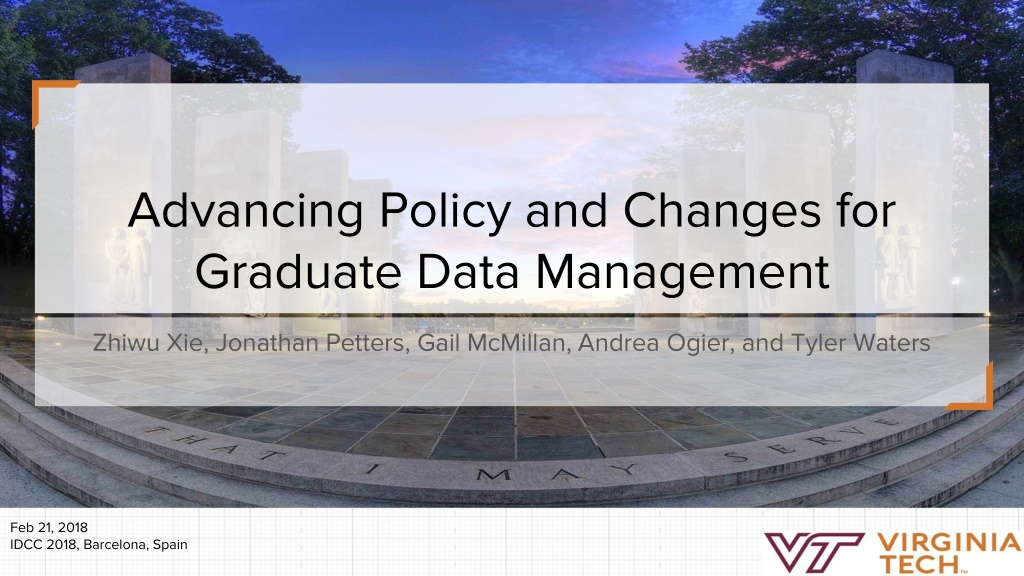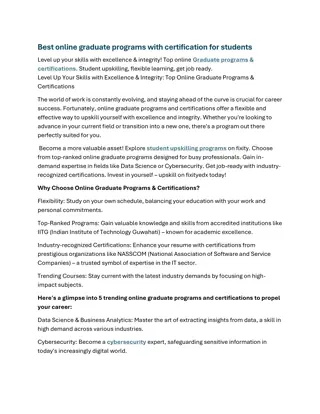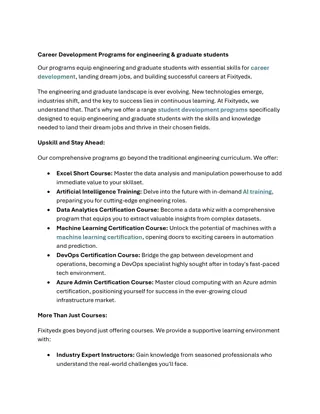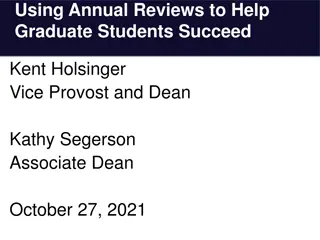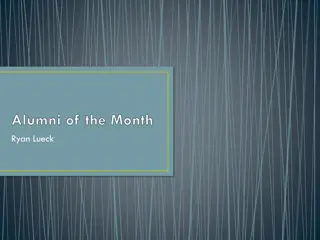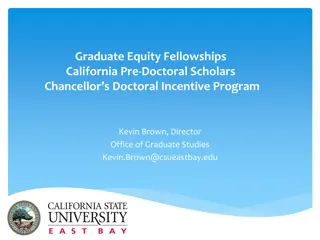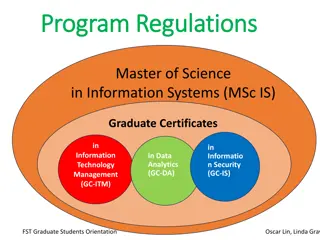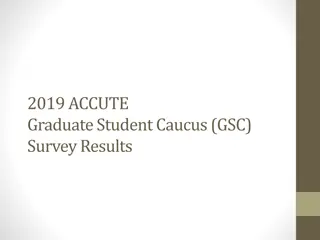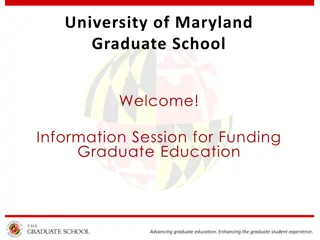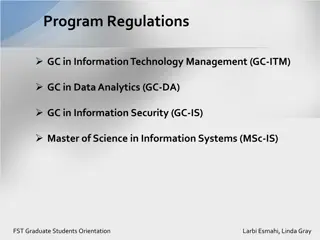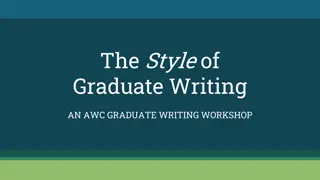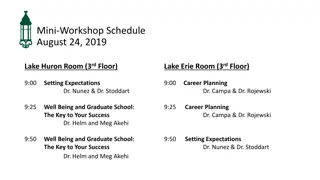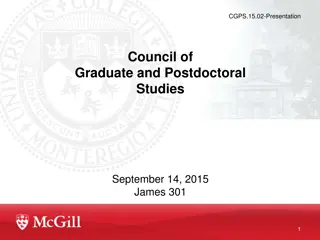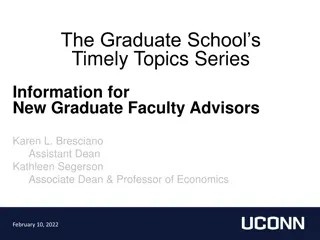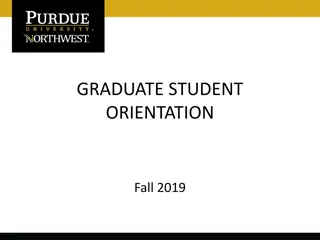Advancing Policy and Changes for Graduate Data Management
Addressing the importance of graduate research data management, this content explores factors driving RDM, profiles of top global universities, and the significance of early career researchers in sponsored research. University profiles A, B, and C highlight variations in research funding, institutional policies, and training initiatives for managing research data effectively.
Download Presentation

Please find below an Image/Link to download the presentation.
The content on the website is provided AS IS for your information and personal use only. It may not be sold, licensed, or shared on other websites without obtaining consent from the author. Download presentation by click this link. If you encounter any issues during the download, it is possible that the publisher has removed the file from their server.
E N D
Presentation Transcript
Advancing Policy and Changes for Graduate Data Management Zhiwu Xie, Jonathan Petters, Gail McMillan, Andrea Ogier, and Tyler Waters Feb 21, 2018 IDCC 2018, Barcelona, Spain
Why Focus On Graduate Research Data Management? Early career researchers Backbone of the sponsored research, where RDM is typically required Lagging behind faculty RDM
Factors Driving Graduate RDM Academic reputation? Research funding? Institutional Open Access and/or RDM policy? Knowledge, skills, and training? Repository support? ETD policy and implementation?
University Profile A Top 10 global university Awards about 3,000 postgraduate degrees per year, and receives > US$400 million research funding per year Approved university open access policy in 2013 Approved university research data management policy in 2015 Conducting graduate data management training since 2011 Institutional Repository (includes research data) in operation since 2000 Released > 2,000 Electronic Theses & Dissertations (ETDs)
University Profile B Top 50 global university Awards about 5,000 postgraduate degrees per year, and receives > US$900 million research funding per year Approved university open access policy in 2015 Approved university research data management policy in 2015 Conducting graduate data management training since 2012 Institutional Repository in operation since 2007, Institutional Data Repository in operation since 2014 Released > 10,000 ETDs
University Profile C Top 300 global university Awards about 2,000 postgraduate degrees per year, and receives > US$500 million research funding per year No explicit university open access policy No explicit university research data management policy Conducting graduate data management training since 2012 Institutional Repository in operation since 2011, Institutional Data Repository in operation since 2016 Released > 30,000 ETDs
Which University Profile Matches This Description? Released fewer than 100 datasets associated with theses and dissertations with DOIs in the institutional repository A B C Top 10 global university Awards > 3,000 postgraduate degrees per year, and receives > US$400 million research funding per year Approved university open access policy in 2013 Approved university RDM policy in 2015 Conducting graduate data management training since 2011 Institutional Repository (includes research data) in operation since 2000 Released > 2,000 Electronic Theses & Dissertations (ETDs) Top 50 global university Awards > 5,000 postgraduate degrees per year, and receives > US$900 million research funding per year Approved university open access policy in 2015 Approved university RDM policy in 2015 Conducting graduate data management training since 2012 Institutional Repository in operation since 2007, Institutional Data Repository in operation since 2014 Released > 10,000 ETDs Top 300 global university Awards about 2,000 postgraduate degrees per year, and receives > US$500 million research funding per year No university open access policy No university research data management policy Conducting graduate data management training since 2012 Institutional Repository in operation since 2011, Institutional Data Repository in operation since 2016 Released > 30,000 ETDs
Does An Explicit Institutional RDM Policy Matter? University staffs and students are encouraged to prepare DMP ought to release data as widely as possible to repositories Research data created by Investigators may be shared for research or scholarly purposes consistent with standard practices of their discipline Principal Investigators are expected to manage the university's ownership of research data... in the ways that best advance the standard routes of publication, presentations, and other usual means of dissemination of research results for that particular field.
Compare To Funding Agencies RDM Policies An appropriate DMP must be provided that specifies: Expected data. Period of data retention. Data formats and dissemination. Data storage and preservation of access. Post-award monitoring and reporting Which is more actionable? Which is more enforceable?
How to Push Through An Institutional Policy? University Committee Board of Visitors University Commission University Council University President Faculty Senate
Lack of Knowledge? Typical curriculum for RDM training What is RDM, why do we need it? Data types, formats, metadata, research data lifecycle Metadata Storage, backup, security Sharing, open access, open science, why they are good for you? Policy, regulation, law, ethics How to fill in forms or use certain websites Not rocket science Even faculty members are not doing it until required by funding agencies
Factors Driving Graduate RDM Academic reputation? Research funding? Institutional Open Access and/or RDM policy? Knowledge, skills, and training? Repository support? ETD policy and implementation?
What Do These Claims Have In Common? If you carefully document, archive, backup your research data every day and release them timely, you will receive more citations and become famous (...or get scrutinized more and turn notorious...) If you stop eating junk food and run 5 miles per day, your health will improve. If you save $882 every month and the savings earn 7% annually tax free, you will be a millionaire in 30 years.
Characterizing RDM True, but not on top of a researcher s immediate priority list Easier said than done, esp for those not already build RDM into a routine Librarians are not quite convincing unless we roll up sleeves and help manage their data Requires non-negligible, upfront costs (time, effort, inconvenience, emotional distress), with indefinite future gains
Libertarian Paternalism Not dictating changes, not taking away options, but making preferred options the default ones and procedurally easier. Choice architect! Librarians as choice architects?
Policy vs. Procedure Policy: if designed by a committee, contains numerous compromises and strategic vagueness Procedure: choice architects build up libertarian paternalism Without procedure supports, policy goes nowhere Policy gets stalled on procedural concerns Understand the stakeholders Design procedures to help, not to harass
Understand Stakeholders Institution: risk averse (law/regulation abiding, tie RDM to this), loss averse (e.g., lose revenue from IPs), also need to promote good science (without which, IPs won t pay, also tie RDM to this). Faculty: research and teaching productivity is the first priority (tie RDM to this); dislike bureaucracy (avoid this); may be apathy, even hostile if RDM is not properly advertised (avoid pie in the sky). Student: graduation and degree is the first priority (tie RDM to this); plan early and nudge often (or many would fail).
Accountability vs. Openness Motivating PIs: victims of poor graduate RDM A graduate student I supervised graduated without leaving me a complete and clearly documented set of data that can be used to support or reproduce the research reported in his/her thesis or dissertation. A later graduate student finds it difficult to reproduce the work from a prior student who has graduated, due to the lack of sufficient data or documentation. A graduate student I supervised lost or mishandled important dataset(s), leading to wasteful repetitions, loss of opportunities, possible compromising of the the research integrity, or other negative consequences. I was asked to review a thesis or dissertation as the committee chair or member, but the original data supporting the research was not fully included in the thesis/dissertation, its appendices, or associated files, I therefore have to put a blind trust in the graphs and conclusions drawn from them.
Ownership Trap ...The university asserts its rights to the results of research, funded wholly or in part with university resources... However, for traditional results of academic scholarship the IP rights remain with the author(s) and the University rights are limited to free (no cost) use ... No explicit rules for research data! Strategic vagueness?
Ownership Trap Mixed messages: university owns your data, you may, shall, ought give them away for free, but at your own risk if anything goes wrong. Bias of loss aversion Ownership questions remind PIs of what they could potentially lose by doing RDM Ownership questions? Ask OVPR. Procedures are not designed to confiscate researchers data.
What We Did Started from the University Commission on Graduate Studies and Policies Leverage long relations between the library and the graduate school over ETDs Leverage library s representation in CGS&P Library working group studied procedures to inject RDM into graduate Plan of Studies, reviewed and revised every semester, and examined at defense. Implement policy 13015 Ownership and Control of Research Results with Graduate School procedures Commission charged pilot projects to test drive procedures Recruiting academic departments Leverage liaison librarians Join faculty meetings, conduct surveys, and rally support from the ground up
VT Updates Procedure changes underway in 1 department Under considerations in 2 departments
Summary Focus on procedures Rallying ground-up support Avoid potential pitfalls
